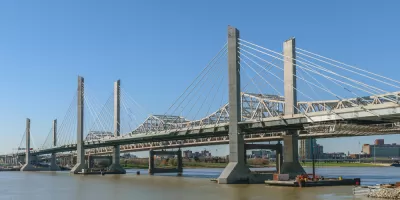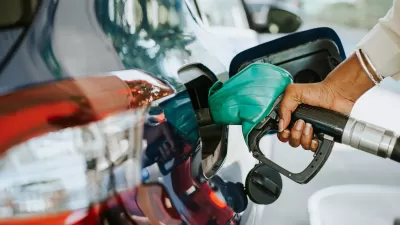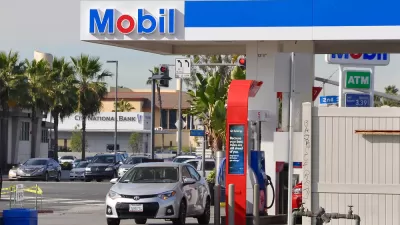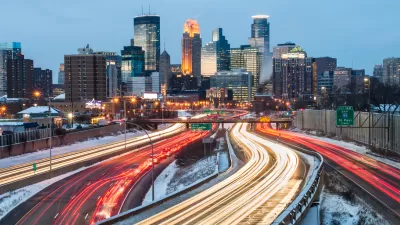The overwhelming majority of states that increased gas taxes last year were Republican-controlled. In states where the legislature is split, it's more difficult to approve transportation funding legislation. Down-ballot races may prove decisive.

Partisanship thwarts proposals to increase state transportation funding. Increasing state gas taxes appears to be easier when both the legislature and governor are controlled by the same party. Well, perhaps not easier, but more likely to occur, according to an article in The Hill last month (posted here).
"Six of those [eight] states [that "passed a fuel tax increase or something similar in 2015"] had a Republican governor and GOP-led legislature when the legislation was approved," reported Melanie Zanona on Sept. 6. Planetizen counted 11 states that approved gas taxes or the like, while the National Conference of State Legislatures counted 10, omitting Alaska, presumably because the .95-cent tax increase wasn't used for transportation improvements.
Daniel C. Vock, Governing’s transportation and infrastructure reporter, looks at how partisanship shapes the transportation funding debate in several states, include Minnesota and Indiana, and the decisive role played by "down-ballot races."
Minnesota
Both Democratic and Republican lawmakers in the state agree on the need to find more money for road improvements and other infrastructure upgrades. But the two parties don’t see eye-to-eye when it comes to how to raise the money for those transportation projects.
Democrats favor raising the gas tax by 10 to 16 cents and increasing vehicle registration fees. Republicans prefer to use revenue from the state’s surplus and to repurpose existing state revenues for infrastructure needs.
Not considering the critical role of he governor, Democrat Mark Dayton, which path the legislature pursues would appear to be determined by the outcome of November's election which could determine who controls the legislature.
Democrats are just seven seats short of a majority in the House, while Republicans only need six more Senate seats to control the upper chamber.
California
A similar scenario will play out in the Democratic-controlled legislature on Nov. 8, where tax increases require a two-thirds majority thanks to Proposition 13 (1978). Sen. Jim Beall's 12-cent gas and 22-cent diesel tax bill can't move forward without Republican support.
Assuming all Democrats support raising the gas tax, which is a huge assumption, the Democrats would need to pick-up one seat in each chamber to pass a bill to hike the gas tax without Republican support.
"The state senate currently consists of 26 Democrats and 14 Republicans, and the Assembly consists of 52 Democrats and 28 Republicans," according to Wikipedia. To get to a super-majority, Democrats will need to pick-up one seat in each chamber.
Indiana
Other transportation funding options also may be determined by down-ballot races. In the Hoosier State, "former Democratic House Speaker John Gregg wants to issue $3 billion in bonds to boost transportation and set up a state infrastructure bank for local governments," adds Vock. Gregg is running against Republican Lt. Gov. Eric Holcomb and Libertarian Rex Bell to replace governor and Republican vice presidential nominee, Mike Pence.
“While interest rates are so low, let's utilize some of the existing dollars the state has squirreled away to not only repair roads and bridges, but to make strategic investments that will spur business growth and improve the quality of life in communities statewide,” Gregg told the Northwest Indiana Times on Aug. 8.
"Holcomb says he would build a fourth port on the Ohio River, add a bridge over the river in Evansville and add a second set of tracks to the South Shore Line to Chicago to ease congestion on the route," adds Vock, "but he hasn’t identified yet how he would pay for them."
Indiana's legislature is controlled by Republicans, yet it was unable to pass a 4-cent gas tax increase, though the Assembly did approve it on Feb. 2 only to see it die in March. So much for it being easier for state legislatures controlled by one party to approve gas tax increases.
Related:
Office of Gov. Mark Dayton & Lt. Gov. Tina Smith: BACKGROUND MEMO [on transportation funding]: Republican Governors and Legislatures Across the U.S. Reject The Tax of Doing Nothing, 04/01/2016.
Since 2013, eighteen states and the District of Columbia have passed gas tax increases to help resolve transportation funding deficits, similar to Minnesota’s transportation crisis. [All 18 are listed].
Also on Planetizen: California Gas Tax Increase Hits Partisan Impasse, July 10, 2015
FULL STORY: How State Elections Could Affect Road Funding

Maui's Vacation Rental Debate Turns Ugly
Verbal attacks, misinformation campaigns and fistfights plague a high-stakes debate to convert thousands of vacation rentals into long-term housing.

Planetizen Federal Action Tracker
A weekly monitor of how Trump’s orders and actions are impacting planners and planning in America.

In Urban Planning, AI Prompting Could be the New Design Thinking
Creativity has long been key to great urban design. What if we see AI as our new creative partner?

King County Supportive Housing Program Offers Hope for Unhoused Residents
The county is taking a ‘Housing First’ approach that prioritizes getting people into housing, then offering wraparound supportive services.

Researchers Use AI to Get Clearer Picture of US Housing
Analysts are using artificial intelligence to supercharge their research by allowing them to comb through data faster. Though these AI tools can be error prone, they save time and housing researchers are optimistic about the future.

Making Shared Micromobility More Inclusive
Cities and shared mobility system operators can do more to include people with disabilities in planning and operations, per a new report.
Urban Design for Planners 1: Software Tools
This six-course series explores essential urban design concepts using open source software and equips planners with the tools they need to participate fully in the urban design process.
Planning for Universal Design
Learn the tools for implementing Universal Design in planning regulations.
planning NEXT
Appalachian Highlands Housing Partners
Mpact (founded as Rail~Volution)
City of Camden Redevelopment Agency
City of Astoria
City of Portland
City of Laramie





























